Delta Air Lines is set to strengthen its presence at Austin-Bergstrom International Airport, capitalizing on the airport’s rapid growth and expanding market share. With the addition of 11 new nonstop flights starting in April, Delta aims to provide increased connectivity and convenience for business travelers in one of the country’s fastest-growing airports.
Austin: A Thriving Business Hub
Austin, Texas has witnessed a remarkable surge in population and economic development in recent years. Renowned for its vibrant tech scene and attracting major companies like Apple, Tesla, and IBM, the city has become a hotbed for innovation and investment. In line with this growth, Delta has recognized the immense potential of Austin as a business travel destination.
Delta’s Expansion Plans
Delta’s upcoming flight additions at Austin-Bergstrom International Airport are set to bolster its peak-day flight count to nearly 50. The new routes will connect Austin with Midland-Odessa and McAllen in Texas, as well as Raleigh-Durham in North Carolina, Nashville, and Cincinnati. Additionally, Delta plans to route connecting passengers through Austin, marking a significant strategic shift for the Atlanta-based carrier.
Eric Beck, Managing Director of Network Planning at Delta, emphasized the importance of this expansion, saying, “For us here at Delta, Texas has historically been a white space for opportunity on our network.” This move allows Delta to tap into previously untapped markets and leverage Austin’s growing popularity as a connecting point for its extensive network.
Identifying Growth Opportunities
While no single company solely drove Delta’s decision to expand in Austin, Beck highlighted the feedback from corporate accounts and the need to provide service to destinations currently underserved. The cities of McAllen and Midland emerged as top choices due to their thriving business communities and unique tourist attractions.
McAllen, located in southern Texas, offers a diverse economy driven by sectors such as healthcare, international trade, and manufacturing. With its close proximity to the Mexican border, McAllen serves as an important gateway for cross-border business activities.
On the other hand, Midland, situated in the heart of the oil-rich Permian Basin, has experienced significant economic growth due to the oil and gas industry. The city has become a hub for energy companies and related services, attracting both business travelers and tourists.
Austin-Bergstrom International Airport: A Growing Passenger Hub
Austin-Bergstrom International Airport witnessed remarkable growth in passenger numbers, serving over 7.1 million travelers in the previous year alone. This represents an 11% increase compared to 2019, demonstrating the airport’s resilience and the strong demand for air travel in the region.
Despite the challenges posed by the Covid-19 pandemic, Austin’s airport managed to outperform the national average, with a modest 5% decline in passenger counts across the United States during the same period. This steady growth has caught the attention of major airlines like Delta, seeking to capitalize on the airport’s expanding market.
Delta’s Market Share in Austin
As of September, Delta held a market share of close to 14% at Austin-Bergstrom International Airport. While Southwest Airlines dominated the market with a 40% share and American Airlines captured a 22% share, Delta’s increased investment and expanded flight offerings are poised to challenge the existing market dynamics.
With its focus on providing seamless connectivity and exceptional service, Delta aims to attract a larger share of business travelers and position itself as a leading airline in Austin. The strategic addition of new routes and the use of Austin as a connecting point will undoubtedly strengthen Delta’s competitive edge in this flourishing market.
Benefits for Business Travelers
Delta’s expanded flight options at Austin-Bergstrom International Airport will bring several benefits to business travelers. The increased number of nonstop flights will provide greater flexibility and convenience, saving valuable time for busy professionals. Additionally, the addition of McAllen and Midland as connecting points opens up new opportunities for business travel within Texas and beyond.
Furthermore, Delta’s renowned customer service and commitment to passenger satisfaction ensure a pleasant and stress-free travel experience. Business travelers can expect a seamless journey, with access to Delta’s extensive network and the airline’s world-class amenities.
See first source: CNBC
FAQ
Q1: Why is Delta Air Lines expanding its presence at Austin-Bergstrom International Airport?
A1: Delta is expanding at Austin’s airport due to the city’s rapid growth, economic development, and its increasing popularity as a business travel destination.
Q2: What are the details of Delta’s expansion plans at Austin’s airport?
A2: Delta is adding 11 new nonstop flights starting in April, connecting Austin with cities like Midland-Odessa, McAllen, Raleigh-Durham, Nashville, and Cincinnati. This will increase Delta’s peak-day flight count to nearly 50.
Q3: How does Delta plan to use Austin as a connecting point in its network?
A3: Delta is strategically routing connecting passengers through Austin, taking advantage of the airport’s growing popularity as a connecting hub.
Q4: What influenced Delta’s decision to expand in Austin?
A4: While no single company drove Delta’s decision, feedback from corporate accounts and the need to serve underserved destinations played a role. McAllen and Midland were chosen due to their thriving business communities.
Q5: What growth has Austin-Bergstrom International Airport experienced recently?
A5: The airport served over 7.1 million travelers in the previous year, marking an 11% increase compared to 2019. Despite the challenges of the pandemic, it outperformed the national average.
Q6: What is Delta’s market share at Austin’s airport, and how does it plan to challenge existing market dynamics?
A6: As of September, Delta had a market share of nearly 14%. Delta plans to challenge the market dominance of Southwest Airlines (40%) and American Airlines (22%) by investing in expanded flight offerings.
Q7: What benefits will Delta’s expanded flight options bring to business travelers?
A7: Business travelers will enjoy greater flexibility, convenience, and time savings with increased nonstop flights. Delta’s commitment to customer service and its network will provide a seamless and pleasant travel experience for professionals.
Featured Image Credit: Photo by Ryan Johns; Unsplash – Thank you!

